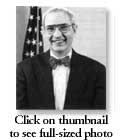Ronald S. Pugsley
Division of Adult Education and Literacy, 1984-2002
Director
Acting Director
Chief, Program Services Brach
Strategic Planning
INTERVIEWER: Cuba Miller
DATE: October 1, 2001
Ron, I want to go on. You meet regularly with state personnel from the Council of State Directors.
RP: Correct.
CM: There's kind of a dual organization there. Besides the council there is the National Adult Education Professional Development Consortium. I'd like for you to talk about those, and the differences between the two, and what the structure and function of these groups are.
RP: The membership is the same.
CM: Yes.
RP: That is the one similarity. The difference is that when we come together as a consortium, the focus is usually on professional development issues. In this case, it's not professional development for the field; it's professional development of managers and state personnel. The consortium has that function and standing here in Washington as a professional development organization.
CM: They actually pay state dues to that consortium?
RP: They pay state dues for that. One of the functions of the consortium is to provide information to the Congress in terms of requests that they make. Sometimes it gets over into the role of the Council of State Directors when you are asked to make certain appearances, or references. When we meet as the Council of State Directors we look at administrative issues that are rising out of the Adult Education Act, or now the Adult Education and Literacy Act. We review formula or distribution issues [and], let's say, priorities under State Leadership Funds in relationship to the National Leadership Fund, which we administer. In both instances we are dealing with priorities in the use of this discretionary money. We look at the whole issue of accountability and reporting. Really ways in which, and this has been more recent, states that are better endowed than other states can mentor or even provide services to those states that are lacking those services. To come back to your question, are there really big differences, sometimes you wouldn't even know at all. It doesn't make that much difference at all.
CM: It kind of sounds like the Council of State Directors, in theory at least, is more administrative, deals with administrative matters connected to the federal legislation, and the National Adult Education Professional Development Consortium is more programmatic.
RP: That's right. I would say the Council of State Directors is concerned with policy, and whether the [policies] of the federal legislation are working or not working. The Council has its own legislative representative who analyzes the legislative scene at the national level for the Council.

